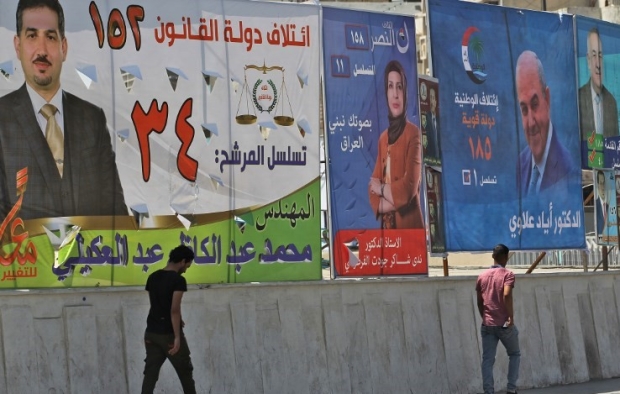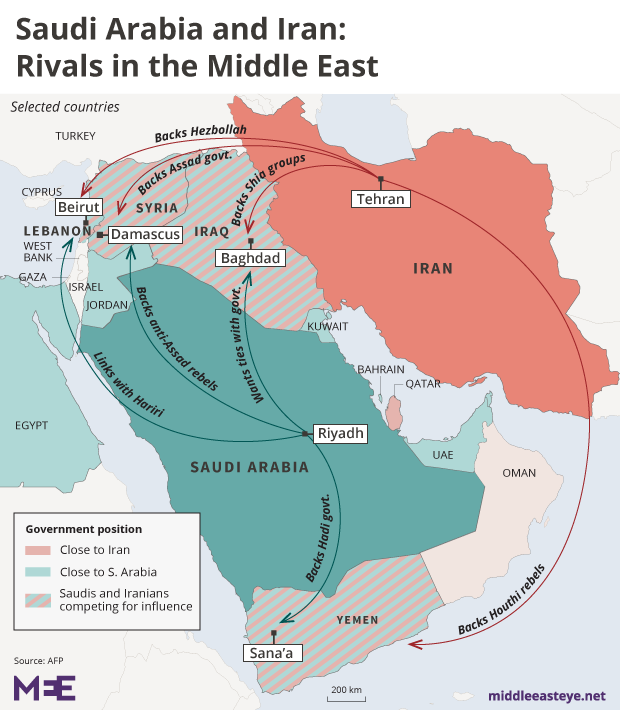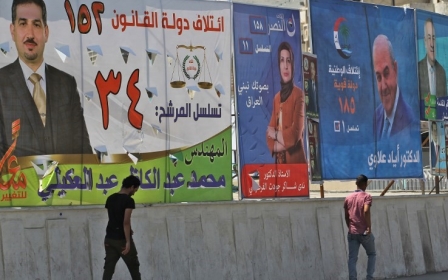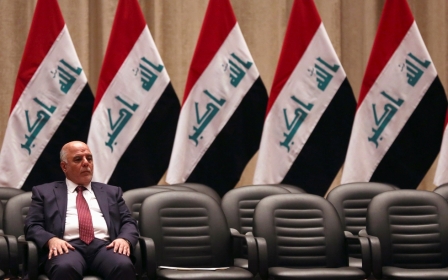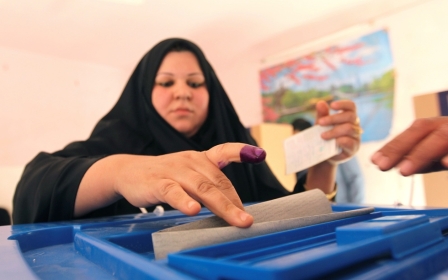Iraq elections: The great game for regional influence
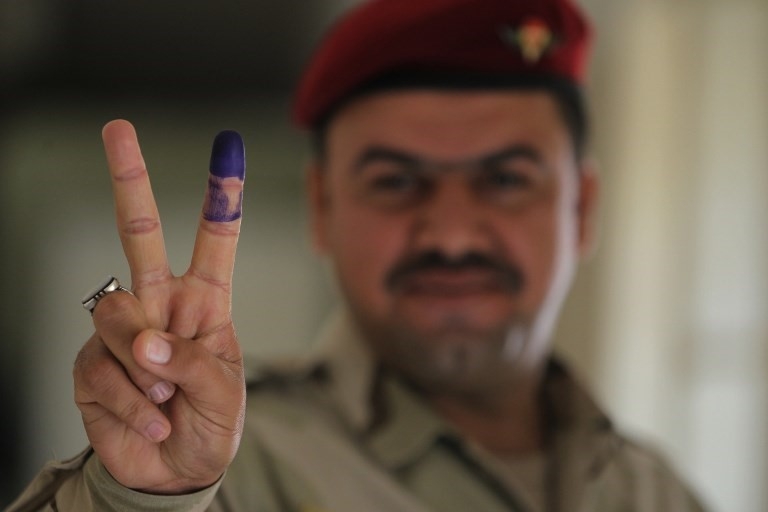
There is good and bad news about the Iraqi elections. The good news is that party lists are split on non-sectarian lines. To be Sunni or Shia is not the determinant factor. There are even splits within party lists themselves.
The bad news is that the Iraqi election, due to be held on 12 May, will be a battleground for competing regional powers with Saudi Arabia, Iran and Turkey all intensely involved in the outcome. In the process Iraqi politics have become fragmented in a mad dash to buy influence. Iraq has become the latest stage in the great game for regional influence.
US, Iran on the same side
Back in 2010 US and Iran found themselves on the same side. In 2010, Ayad Allawi's predominantly Sunni al-Iraqiya (Iraqi National Movement) list gained the largest share of the vote (24.7 percent) and the greatest number of parliamentary seats (91 out of 325), edging narrowly ahead of incumbent Prime Minister Nouri al-Maliki's Shia-dominated State of Law coalition (24.2 percent of the vote and 89 seats).
But Maliki, prime minister since 2006, was able to stay in office in part because he retained the backing of both Washington and Tehran. Maliki was re-elected in 2014 but was subsequently forced to resign in August that year, within months, as the Islamic State (IS) claimed control of Mosul, Iraq's second city, and large areas of the north of the country.
He was replaced by Haider al-Abadi, his main rival within the Dawa party which has been in power since 2005.
The Iraqi election on Sunday will be a battleground for competing regional powers with Saudi Arabia, Iran and Turkey all intensely involved in the outcome
"When al-Iraqiya in 2010 became the largest party it should have had a prime minister. But [US President Barack] Obama got Arab countries to pressurise Allawi to cede power to Maliki, who belonged to Iran," an Iraqi politician from one of the country’s predominantly Sunni blocs said of the failed power-sharing experiment.
"We were surprised that the US was going to Iran. The US told us: 'We are more concerned to have a stable democratic state which is dominated by Shia that could help to force Iranians to see that they could have a better system controlled by the Shia.'"
From his point of view, Washington had turned against the Sunnis largely because they still remembered how US troops in Iraq had faced the fiercest resistance in predominantly Sunni areas during the occupation.
Saudi-Iran rivalry
Today however Iran is reaching out to both Sunni- and Shia-dominated political lists as it seeks to consolidate its influence in areas of the country where the Popular Mobilisation units (PMU), also known as al-Hashd al-Shaabi, the paramilitary units that fought alongside Iraqi security forces to expel IS, have been able to gain a firmer foothold with the collapse of IS and the weakening of the Kurdish Regional Government (KRG) since last year’s independence referendum.
"Sunnis started to support the Iranian stance, so Iranians started to pressurise the Sunni leaders through the Hashd al-Shaabi. This has implications."
Competition between Saudi Arabia and Iran has already led to splits within two predominantly Shia parties: the ruling Dawa party, and the Supreme Islamic Council.
Dawa was divided into the Nasr (Victory) coalition headed by Abadi, who is now seen as leaning towards Saudi Arabia, while Maliki, the party leader, is heading the State of Law coalition and is generally considered to be pro-Iranian. To accomplish this, a law was passed in parliament allowing one party to run in two competing lists.
Turkey could well find itself in the position of being the arbiter, of whether Iraq leans east to Iran or south west to Saudi Arabia and UAE
A third list, Fatah, representing the Hashd al-Shaabi and headed by Hadi al-Amiri, the leader of the Badr Brigades militia group, is considered to be solidly pro-Iranian. However a fourth list called Sairoon (the Marchers), headed by influential Shia religious leader Muqtada al-Sadr, once a symbol of Shia opposition to the US occupation, now leans toward Saudi Arabia.
Last year, al-Sadr made a rare visit to Saudi Arabia where he was photographed meeting Mohammed bin Salman. In an earlier interview, he also told MEE that sectarian militias had no place in Iraq. A former speaker in the Iraqi parliament told MEE that Sadr was the "Shia who is closest to Sunnis" and the Shia leader who was "most open to dialogue".
A fifth Shia-dominated list, Hikmah (Wisdom), is the offshoot of the split in the Supreme Islamic Council of Iraq, headed by Ammar al-Hakim.
Qassem Soleimani, the head of the Iranian Revolutionary Guards' Quds Brigade, who has become Iran's de facto pro consul in Iraq, has been trying in vain since February to unify Shia leaders by getting Abadi, Amiri and Hakim to form one list. One special envoy sent by Soleimani spent 12 hours trying to persuade the three men to put their differences aside.“This was an attempt to give legitimacy to al-Hashd al-Shaabi. However a few hours after the announcement, the Saudis pressurised Abadi to withdraw and he did,” an Iraqi analyst told me.
Divided loyalties
Sunni-dominated lists are also divided in their loyalties to competing regional powers. Al Qarar (the Resolution) is led by Khamis Khanjar and Osama el Nujifi, one of Iraq’s three deputy presidents. It has 10 smaller parties in the coalition and is seen to be closer to Turkey and Qatar, the latter of which is currently blockaded by Saudi Arabia.
The second list, known as Al-Wataniya (the National Coalition), includes the Muslim Brotherhood-linked Iraqi Islamic Party, the country’s largest Sunni party, and Allawi, a former prime minister.
Two secular groups and Islamist parties within the list are considered to be closer to Iran, while Allawi is seen as leaning towards the Emirates. A third list, al-Hal (the Solution) headed by Jamal al-Karboli, is seen as being closer to Saudi Arabia.
Move north and the picture is the same. One list, called Kurdistani, is formed from Kurdistan's two ruling parties PUK and KDP, the former pro-Iranian while the latter is close to Turkey.
The second list is formed by Kurdish Islamists who have gone into alliance with a splinter group from the Talabani camp called the Gorran movement or Change. The third is led by Barhem Saleh, one of three deputy prime ministers of Iraq.
Turkey could well find itself in the position of being the arbiter of whether Iraq leans east to Iran or south west to Saudi Arabia and UAE. The counter argument for these calculations is that Iraqis of whatever confession cannot be treated like regional proxies.
For the health of what is left of this shattered nation, they should not. But for that to happen, party leaders should not behave like regional proxies either. The extent to which they have been behaving like goods and chattle will only become clear after the election.
The US occupation may have ended , but the mentality that drives it and sustains it still lives on.
- David Hearst is editor-in-chief of Middle East Eye. He was chief foreign leader writer of The Guardian, former Associate Foreign Editor, European Editor, Moscow Bureau Chief, European Correspondent, and Ireland Correspondent. He joined The Guardian from The Scotsman, where he was education correspondent.
The views expressed in this article belong to the author and do not necessarily reflect the editorial policy of Middle East Eye.
Photo: A member of the Iraqi security forces flashes the "v" sign for victory after voting at a polling station in the Iraqi capital Baghdad to vote ahead of parliamentary elections on 10 May, 2018. (AFP)
New MEE newsletter: Jerusalem Dispatch
Sign up to get the latest insights and analysis on Israel-Palestine, alongside Turkey Unpacked and other MEE newsletters
Middle East Eye delivers independent and unrivalled coverage and analysis of the Middle East, North Africa and beyond. To learn more about republishing this content and the associated fees, please fill out this form. More about MEE can be found here.



